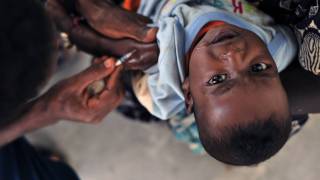Infant Vaccinations Co-administered with MenACWY-TT Vaccine Found Effective

The number of vaccines delivered to infants during their early life continues to be a concern.
Vaccines are available that can help prevent meningococcal disease, which is any type of illness caused by Neisseria meningitidis bacteria.
A new study reports some good news regarding when to administer the meningococcal vaccine.
The Centers for Disease Control and Prevention (CDC) recommends a meningococcal conjugate vaccine (Menactra® or Menveo®) for a subgroup of children who are between 2 months and 10 years old if certain criteria are met.
This study is the first to evaluate the safety and immunogenicity of MenACWY-TT when coadministered with diphtheria-tetanus-acellular pertussis-hepatitis B-inactivated poliovirus virus-Haemophilus influenza type b (DTPa-HBV-IPV/Hib) and pneumococcal conjugate vaccine (PHiD-CV), according to a 3+1 or 2+1 schedule in infants/toddlers.
These researchers said the vaccination with the meningococcal quadrivalent tetanus toxoid conjugate vaccine (MenACWY-TT) can be considered as an alternative option to using monovalent meningococcal vaccines in pediatric immunization schedules.
Additionally, it can be co-administered with the DTPa-HBV-IPV/Hib and 10-valent PHiD-CV vaccines.
This study reported for each DTPa-HBV-IPV/Hib antigen, ≥97.2%, ≥76.5% and ≥97.9% of participants had seropositive/seroprotective levels one-month post-primary vaccination, before the booster dose, and one-month post-booster, respectively.
For each vaccine pneumococcal serotype, ≥74.0% of infants had antibody concentrations ≥0.35 μg/mL at one-month post-primary vaccination, and robust increases in antibody GMCs were observed from pre- to post-booster.
Which means, these results support the co-administration of MenACWY-TT with routine childhood vaccines.
This phase 3 clinical trial NCT01144663 was a randomized, multicenter trial included 2,095 infants. After vaccination, a high percentage of the cohort achieved seroprotective antibody levels for anti-DT, anti-TT, anti-PRP, anti-HBs, and anti-poliovirus types 1, 2, and 3 antibodies for both postprimary (≥97.2%) and post-booster (≥97.9%) administration.
Study conflict of Interest and Source of Funding: GlaxoSmithKline Biologicals SA was the funding source and was involved in all stages of the study conduct and analysis. GlaxoSmithKline Biologicals SA also funded all costs associated with the development and the publishing of the present manuscript.
Our Trust Standards: Medical Advisory Committee

























